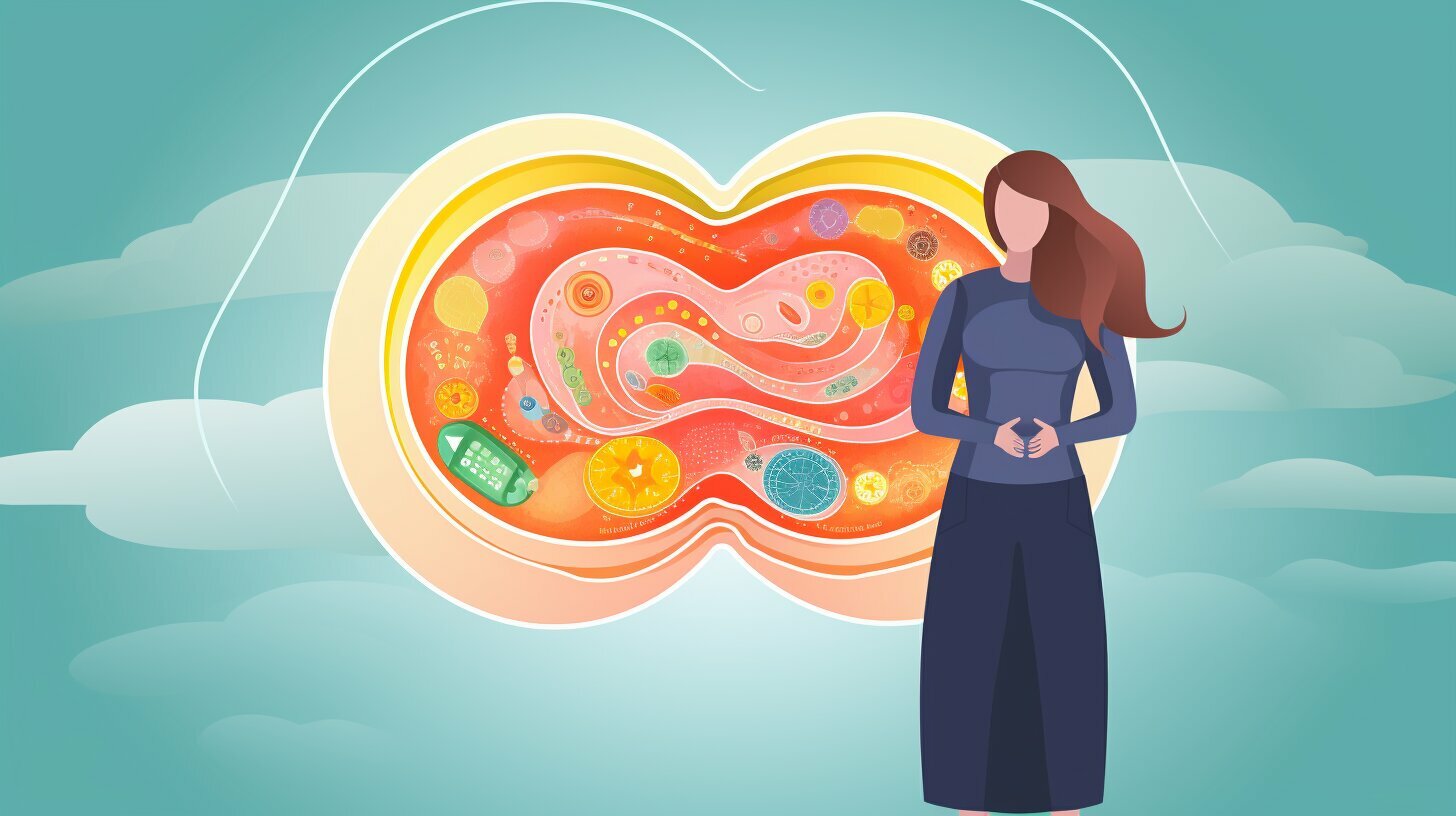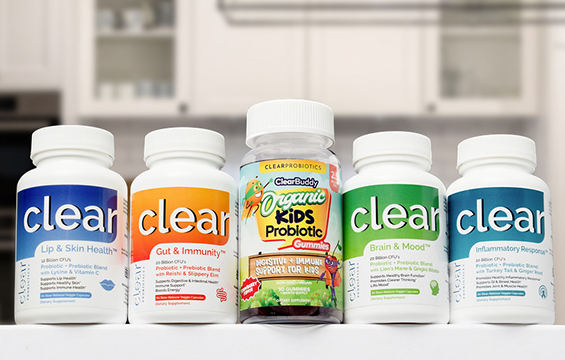Table of Contents
ToggleProbiotics have been shown to have a significant impact on menstrual health by influencing hormone synthesis and regulation through the gut microbiome.
The gut microbiome, particularly the estrobolome, plays a crucial role in estrogen metabolism and maintaining hormonal balance.
An imbalance in gut bacteria can lead to menstrual irregularities such as estrogen dominance or low estrogen levels.
However, incorporating probiotics into your routine can help restore a healthy balance of gut flora, improve digestion, and eliminate toxins.
This, in turn, promotes hormonal balance and positively affects the menstrual cycle.
Consuming fermented foods, considering probiotic supplementation, and incorporating a diverse range of plant fiber into your diet can support overall gut health and hormone regulation for a regular and healthy menstrual cycle.
Key Takeaways:
- Probiotics have a significant impact on menstrual health by influencing hormone synthesis and regulation through the gut microbiome.
- An imbalance in gut bacteria can lead to menstrual irregularities such as estrogen dominance or low estrogen levels.
- Probiotics help restore a healthy balance of gut flora, improve digestion, and eliminate toxins, promoting hormonal balance.
- Consuming fermented foods, considering probiotic supplementation, and incorporating a diverse range of plant fiber into your diet can support overall gut health and hormone regulation.
- Gut health is crucial for maintaining a regular and healthy menstrual cycle.
The Role of the Estrobolome in Menstrual Health
The estrobolome, a subset of the gut microbiome, plays a crucial role in hormone synthesis and metabolism, affecting the regularity of menstrual cycles.
It is responsible for metabolizing estrogen and maintaining the delicate balance of hormones necessary for a healthy menstrual cycle.
An imbalance in the estrobolome can lead to disrupted estrogen metabolism, resulting in menstrual irregularities.
To understand the impact of the estrobolome on menstrual health, let’s take a closer look at how it works. Estrogen, a key hormone involved in the menstrual cycle, is produced by the ovaries.
However, estrogen metabolism also occurs in the gut, where the estrobolome influences its breakdown.
The estrobolome consists of various gut bacteria that produce enzymes, such as beta-glucuronidase, which can either promote or inhibit estrogen metabolism.
When the estrobolome is in balance, it helps to maintain optimal estrogen levels, promoting a regular menstrual cycle.
| Effects of Estrobolome Imbalance | Consequences |
|---|---|
| Excessive estrogen production | Heavy or irregular periods, hormonal imbalances |
| Inadequate estrogen breakdown | Low estrogen levels, menstrual irregularities |
It is crucial to maintain a healthy balance of gut bacteria to support optimal estrogen metabolism and a regular menstrual cycle. Taking probiotics can help restore and maintain a healthy estrobolome.
Probiotic supplements contain beneficial bacteria that can promote the growth of helpful gut flora, supporting optimal hormone regulation and overall menstrual health.
Restoring Hormonal Balance with Probiotics
Probiotics offer a solution for restoring hormonal balance by promoting a healthy balance of gut flora, enhancing digestion, and eliminating toxins.
The gut microbiome plays a crucial role in hormone regulation, and an imbalance in gut bacteria can lead to menstrual irregularities.
By supporting gut health, probiotics can help restore proper estrogen metabolism and promote a regular menstrual cycle.
“The gut microbiome has a profound impact on estrogen levels and overall hormonal balance. Probiotics can help restore a healthy gut flora, which is essential for optimal hormone regulation.” – Dr. Sarah Johnson, Women’s Health Specialist
Research has shown that probiotics can improve digestion and nutrient absorption, ensuring that the body receives the necessary nutrients for hormonal balance.
Probiotics can eliminate toxins and reduce inflammation, which can contribute to hormonal imbalances.
By restoring gut health, probiotics create an environment conducive to maintaining a regular menstrual cycle.
Supporting Gut Health
Incorporating probiotic-rich foods into your diet, such as yogurt, kefir, and sauerkraut, can promote a healthy balance of gut flora.
These foods contain live bacteria that can colonize the gut and support optimal digestion and hormone regulation.
Increasing your intake of plant fiber, such as fruits, vegetables, and whole grains, can provide prebiotic fibers that nourish beneficial gut bacteria.
| Probiotic-Rich Foods | Plant Fiber Sources |
|---|---|
| Yogurt | Apples |
| Kefir | Broccoli |
| Sauerkraut | Beans |
For those who struggle to consume enough probiotic-rich foods, probiotic supplements can be a convenient option.
However, it is essential to consult with a healthcare professional before starting any new supplementation to ensure it aligns with your specific needs and health goals.
Remember, a healthy gut is the foundation for overall menstrual well-being.

Probiotics and Menstrual Symptom Relief
Probiotics have shown promise in providing relief from menstrual discomfort and can be considered a natural remedy for managing period symptoms. M
any women experience discomfort during their menstrual cycle, such as cramps, bloating, and mood swings.
These symptoms can significantly impact daily activities and overall well-being. Fortunately, probiotics offer a potential solution to alleviate these discomforts.
Studies have suggested that certain strains of probiotics, such as Lactobacillus and Bifidobacterium, can help reduce menstrual pain and inflammation.
These beneficial bacteria work by promoting a healthy balance of gut flora and modulating the immune response in the reproductive system.
By reducing inflammation and restoring balance, probiotics may provide relief from menstrual discomfort.
A healthy gut microbiome promotes proper digestion and absorption of nutrients, ensuring optimal hormone synthesis and metabolism.
Furthermore, probiotics help eliminate toxins that can disrupt hormonal balance and contribute to menstrual irregularities.
They can provide personalized guidance on selecting the most suitable probiotic strains and dosage for individual needs.
Incorporating probiotics into a comprehensive approach that includes a balanced diet, exercise, and stress management techniques can further enhance menstrual health and overall well-being.
Supporting Hormonal Balance with Diet
A diet rich in fermented foods and a diverse range of plant fiber can play a crucial role in supporting hormonal balance by promoting gut health.
Fermented foods, such as yogurt, sauerkraut, and kimchi, are packed with beneficial bacteria known as probiotics.
These probiotics help restore the natural balance of gut flora, which is essential for optimal digestion and nutrient absorption.
By improving the health of the gut, fermented foods can indirectly support hormone regulation and a regular menstrual cycle.
In addition to fermented foods, consuming a diverse range of plant fiber is equally important for promoting gut health.
Plant fiber acts as a prebiotic, providing nourishment for the beneficial bacteria in the gut.
This helps to maintain a healthy balance of gut flora and supports the production of short-chain fatty acids, which play a role in regulating hormone metabolism.
A well-balanced diet comprising a variety of fruits, vegetables, whole grains, and legumes provides essential nutrients that support overall hormonal balance.
Including foods like broccoli, flaxseeds, and lentils, which are rich in phytoestrogens, can help modulate estrogen levels and promote a healthy menstrual cycle.

Table: Foods that Promote Hormonal Balance
| Food | Benefits |
|---|---|
| Yogurt | Contains probiotics that support gut health |
| Sauerkraut | Rich in probiotics, aids digestion |
| Kimchi | Contains probiotics and aids in gut health |
| Broccoli | Rich in phytoestrogens, helps regulate estrogen levels |
| Flaxseeds | High in phytoestrogens, supports hormonal balance |
| Lentils | Good source of phytoestrogens, aids in hormone regulation |
“A well-balanced diet comprising a variety of fruits, vegetables, whole grains, and legumes provides essential nutrients that support overall hormonal balance.”
Incorporating these foods into your daily diet can help promote gut health and support hormonal balance.
If you have concerns or persistent symptoms, it is advisable to consult with a healthcare professional who can provide personalized guidance and support.
Considering Probiotic Supplementation
Considering probiotic supplementation can be a valuable addition to a woman’s health routine, potentially enhancing menstrual health.
Probiotics are live microorganisms that, when consumed in adequate amounts, can confer health benefits to the host.
These beneficial bacteria help restore the balance of the gut microbiome, which plays a crucial role in overall well-being, including hormone regulation and menstrual health.
Probiotic supplements are formulated to contain specific strains of bacteria that have been shown to support gut health and promote a healthy balance of microflora.
By replenishing the gut with beneficial bacteria, probiotic supplementation can help improve digestion and eliminate toxins, creating a more favorable environment for hormonal balance.
It is important to note that not all probiotic supplements are created equal. The effectiveness of a probiotic supplement depends on the specific strain(s) of bacteria included, as well as the dosage and formulation.
Therefore, it is recommended to consult with a healthcare professional, such as a gynecologist or a registered dietitian, before starting any new supplementation regimen.
Fiber-rich foods such as fruits, vegetables, whole grains, and legumes provide the necessary nutrients for a healthy gut microbiome.
Fermented foods like yogurt, kefir, sauerkraut, and kimchi contain live cultures of beneficial bacteria that can contribute to a thriving gut ecosystem.
| Benefits of Probiotic Supplementation for Menstrual Health |
|---|
| Restores the balance of the gut microbiome |
| Improves digestion |
| Eliminates toxins |
| Supports hormonal balance |

A Word from HealthyVibe
Establishing and maintaining proper gut health is essential for ensuring a regular and healthy menstrual cycle.
The gut microbiome, particularly the estrobolome, plays a crucial role in hormone synthesis and regulation, including estrogen metabolism.
When there is an imbalance in gut bacteria, it can lead to estrogen dominance or low estrogen levels, which can result in menstrual irregularities.
In conclusion, prioritizing gut health is of utmost importance when aiming for a regular and healthy menstrual cycle.
Women can support hormone regulation and overall menstrual well-being by establishing and maintaining proper gut health through diet and probiotic supplementation.
FAQ
What is the role of the estrobolome in menstrual health?
The estrobolome, part of the gut microbiome, is crucial in hormone synthesis and regulation, including estrogen metabolism. An imbalance in gut bacteria can lead to menstrual irregularities.
How can probiotics help restore hormonal balance?
Probiotics support gut health, improve digestion, and eliminate toxins, all of which contribute to a healthier hormonal environment. By restoring a healthy balance of gut flora, probiotics can help promote hormonal balance.
What are the potential benefits of probiotics for menstrual symptom relief?
Probiotics have shown promise in alleviating menstrual discomfort, such as cramps, bloating, and mood swings. Considering probiotic supplementation can be a natural remedy for managing period symptoms.
How does diet affect hormonal balance?
Consuming fermented foods, which are rich in beneficial bacteria, and incorporating a diverse range of plant fiber can support gut health and hormone regulation. Diet plays a crucial role in maintaining hormonal balance.
Should I consider probiotic supplementation for menstrual health?
Probiotic supplementation can be beneficial for enhancing menstrual health, but it’s important to consult with a healthcare professional before starting any new supplementation. They can provide personalized recommendations.
Why is gut health important for a regular menstrual cycle?
Gut health is essential for maintaining a regular menstrual cycle. The connection between gut health, hormone regulation, and overall menstrual well-being highlights the importance of prioritizing gut health for optimal menstrual health.












